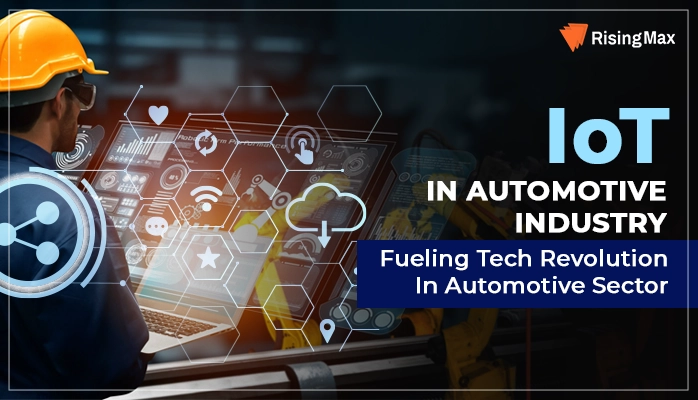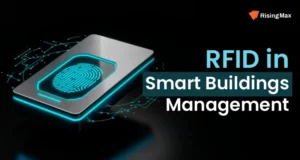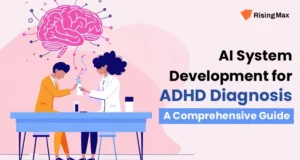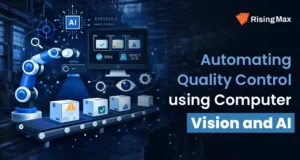Big names in the automotive industry, such as Tesla, BMW, Jaguar, Honda, and others are integrating and experimenting with next-gen tech-based solutions. These automotive software solutions are employed in the manufacturing of electric cars and self-driving vehicles, as well as more efficient fleet management. The automotive sector is driven by digital technology, creating more safe, secure, environment-friendly, and appealing vehicles for customers.

The Internet of Things is one such revolutionary technology that has the potential to transform the automotive sector. IoT-based automotive solutions are making vehicles smarter and more advanced than ever before. Automotive IoT solutions enable vehicles to perform predictive analysis, communicate with other vehicles, and offer seamless driving experiences.
Integrating IoT with automotive solutions opens up a whole new world of possibilities for entrepreneurs worldwide. Are you planning to develop automotive IoT software to take advantage of this tech trend in the automotive sector? Then, reach out to our experts at RisingMax Inc. With our in-depth market and IoT technology, our team can design and develop a perfect solution that perfectly aligns with the automobile industry. Schedule a FREE business consultation call with our experts and discuss your automobile IoT project TODAY!
This post will specifically discuss automotive IoT solutions and how these advanced tech solutions are moving the automobile industry toward the future. Let’s dive deep into the topic and understand the impact of IoT in the automotive sector.
What is IoT (Internet of Things) in the Automotive Industry or Automotive IoT?
The Internet of Things in the automotive industry, or Automotive IoT, is a complex system of interconnected devices, gadgets, cloud computing, sensors, apps, and others. The entire IoT system can be connected to an automotive manufacturing unit or a vehicle for automating and streamlining various operations.
Automotive manufacturers are implementing and integrating IoT-powered software to streamline workflow, automate complex processes, enhance R&D, and build smart cars. In comparison, the amalgamation of the Internet of Things with vehicles empowers them to provide a smarter, more comfortable, and safer driving experience.
Although automotive IoT solutions are in the nascent stages, more advanced and innovative software will emerge. This creates an ecosystem for vehicles to communicate, find nearby spaces via smart parking apps, and bring the self-driven cars’ reality to life.
Automotive IoT Architecture: A Connected Vehicle And IoT System
Let’s understand automotive IoT with an example of a connected vehicle and IoT system architecture. When it comes to designing an automotive IoT application architecture, there are basically four main app components.
Image URL: https://www.researchgate.net/figure/Extended-ACO-Architecture-for-Connected-Cars-and-Vehicular-IoT_fig3_324329621
Application Layer
The topmost application layer allows users to interact with the IoT system via Mobile (iOS and Android) and Web applications. Apps will readily access the information via cloud servers and share the same with the end user or driver.
Cloud Service Layer
This layer is responsible for data storage and real-time information sharing among various interconnected devices. As all the nearby vehicles are interconnected within the network, drivers can get real-time updates from IoT devices and sensors.
Virtual Object Layer
This layer is responsible for real-time information sharing via IoT sensors and devices with the help of LAN, WAN, and other wireless technologies.
Object Layer
This layer is responsible for creating a secure ecosystem for different vehicles to interact, access and share information.
Use Cases of Automotive IoT
The advent of automotive IoT has opened up new business opportunities for the automobile industry worldwide. Implementation of IoT technology paves the foundation for autonomous cars in the automotive transport system and revolutionizes the way how modern-day vehicles will interact with one another. Here are some of the prominent use cases of automotive IoT;
Advanced Driver Assistance Systems (ADAS)
Today, most vehicles are equipped with advanced driver assistance systems (ADAS). This technology empowers vehicles to avoid collisions, monitor nearby areas, lane, and park assist. ADAS-equipped vehicles will monitor the surrounding area and warn drivers of the potential hazards. If needed, the ADAS vehicle will apply emergency brakes to prevent a collision. In the future, a more advanced version of ADAS will be implemented inside IoT-connected cars to offer more advanced services.
Object Recognition
Light detection and ranging (LiDAR) technology is implemented in vehicles to receive input via radar, and sensors, and carefully analyze the received information. Implementing this technology enables vehicles to analyze and differentiate between objects at a distance. Integrated with IoT, LiDAR creates a 3D view of the surrounding areas of about 100 m, thus offering an advanced driving experience.
Lane-keeping Assist
Lane-keeping assist technology creates a more safe and secure environment for drivers to drive their vehicles. Integrated sensors, IoT devices, and programmable logic controllers (PLCs) play a major role in secure data storage and real-time insights. LKA technology is integrated with IoT and ADAS technology to enhance its capabilities and offer more practical security features.
Connected Cars
The various concepts related to connected cars, such as vehicle-to-vehicle, vehicle-to-infrastructure, vehicle-to-pedestrians, and vehicle-to-network are becoming a reality with IoT technology. Connected cars use a connected vehicle-to-everything (CV2X) concept to exchange information between vehicles and smart transport systems.
Align the current state of IT with your business strategy by hiring the most trustworthy IoT Development Company
Vehicle Predictive Analysis
Automotive IoT systems enable vehicles to collect data from various interconnected devices and sensors for predictive analysis. With this, the performance of vehicle components can be analyzed to assess future outcomes of components. Thus, enabling drivers to take necessary steps to maintain or replace vehicle components to avoid sudden breakdowns.
Vehicle Preventive Maintenance
Similar to indicators on vehicle dashboards, this IoT-based system raises an alert on dashboards or sends them on the driver’s mobile. Leveraging this real-time information, drivers make well-informed decisions and prevent the failure of any vehicle component. This ensures timely maintenance of vehicles and component repair before they break.
Autonomous Vehicles
In the automobile industry, autonomous vehicles are the most discussed topic. Proponents believe that autonomous vehicles will become a reality with the introduction of automobile IoT. A connected system of cars, IoT devices, and sensors, empowers the automobile sector to offer vehicles that are capable of performing all driving functions without any human interference. A highly advanced IoT system will eliminate the possibility of human error and make driving more secure than ever.
Manage Fleet
For businesses involved in supply chain and logistics operations, IoT technology has proven beneficial for effective fleet management Platform. Trucks and transportation vehicles are integrated with sensors that can measure weight, track location, and perform preventive analysis. With all the information available on a single dashboard makes it easy for fleet managers to stay updated with various associated parameters.
Benefits of Using IoT in The Automotive Industry
IoT-powered automotive solutions are widely used in vehicle manufacturing to drive innovation and streamline business operations. Looking at the wide-ranging benefits of IoT automotive solutions, we see an increasing number of use cases in the automobile sector. Let’s discuss the prominent benefits of automotive IoT solutions in detail;
Industrial Automotive IoT Solutions
These types of automotive IoT solutions are specifically built for vehicle manufacturing units and collect data related to various manufacturing processes. This data can be later processed and analyzed to eliminate obsolete processes and streamline entire manufacturing unit operations. Implementing automotive IoT solutions in manufacturing units reduces human error, enhances efficiency, streamlines processes reduces losses, and offers various other benefits.
Improved Driving Experience
Automotive IoT solutions make it easy for drivers to operate music systems, use navigation, raise collision alerts, apply emergency braking, and others. These highly advanced features create a safe and secure ecosystem for drivers providing an enhanced driving experience.
Access Vehicle Information
Automotive IoT is an interconnected network of various sensors and IoT devices, constantly collecting and analyzing vehicle data. The system provides easy access to vehicle information such as fuel level, real-time location, preventive maintenance schedule, and others, saving drivers valuable time and reducing the chances of a breakdown.
Safety for Drivers and Pedestrians
IoT-powered automotive solutions such as ADAS, lane keeping assist, and others assist in the safety of drivers and pedestrians. With this, vehicles can detect road obstruction and collision, and apply emergency braking, assisting drivers in avoiding accidents and enhancing driving experience.
Enhanced Vehicle Maintenance
Integration of IoT sensors and devices in vehicles results in creating an ecosystem where the driver is well aware of the condition of vehicle components. Leveraging this information, drivers can take preventive measures to prevent vehicle breakdowns.
How Much Does IoT-based Automotive App Development Cost?
When it comes to automotive IoT app development, there’s no fixed project cost to multiple cost-driving factors. To provide you with a clear project understanding of these cost-driving factors, we have listed some prominent ones;
- Type of automotive IoT app
- IoT app features and functionality
- Project complexity
- Integrated security features.
- Location of custom software app development company
- Project size and time frame.
- Required technology stack.
- Team strength.
An IoT app development company will share an estimated project development cost based on the above factors. A basic automotive IoT application cost ranges between $40k to $45k. However, the overall project cost might increase based on the above factors and the client’s requirements.

Why Choose Us for IoT-powered Automotive App Development?
As a leading automotive software development company in NYC, USA, we assist automotive businesses worldwide in implementing next-gen technologies. Our team leverages its domain expertise to design and develop robust automotive apps at par with changing technology trends.
Here’s why you hire us;
- Unmatched automotive software expertise.
- Affordable software solutions.
- Customized automotive apps.
- Highly experienced and certified IoT team.
- Transparent pricing policy.
- 24*7 customer support.
Connect over a FREE business consultation call and discuss your IoT-based automotive application idea with our experts TODAY!














